'Like 2014, 2017 was also Modi's election.'
'Every voter you met, apart from those who are BJP cadres, everybody said they would vote for Modi, not the BJP.'
'The one and only factor is the Modi juggernaut. He is the one who turned the tide.'
'The wave which he created in 2014, and to maintain it for three years, is a huge task in itself.'
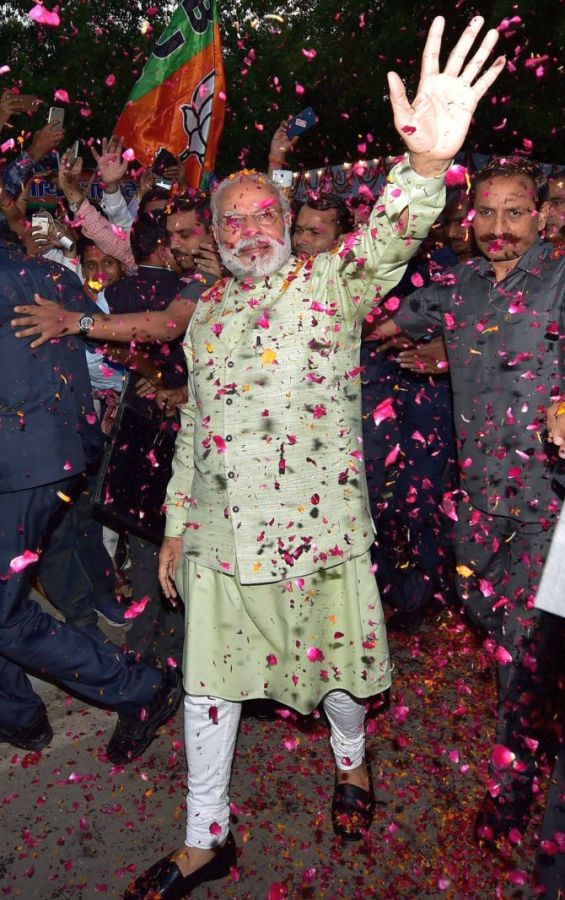
'But he will be a big flop if he tries to rule UP by proxy.'
Narendra Modi welcomed with rose petals at the Bharatiya Janata Party headquarters, March 12, 2017. Photograph: Manvender Vashist/PTI Photo
Political commentator and long-time Rediff.com contributor Sharat Pradhan, who has for decades been a keen observer of the ups and downs in Uttar Pradesh, discusses with Rediff.com's Prasanna D Zore how the Bharatiya Janata Party decimated the Samajwadi Party, Congress and Bahujan Samaj Party in the 2017 assembly election.
'Even Modi would not understand the scale of this victory'
How do you read the UP election results? What's your assessment of the BJP's TsuNamo?
This is absolutely mind-boggling and one can't understand (the scale of BJP's victory).
Even Narendra Modi would not be able to understand how and why it happened, honestly speaking.
I thought the BJP will emerge as a single largest party, or close to a simple majority. That was my view even a day before the results were declared.
Nobody imagined this would turn into this big a tsunami!
Even Amit Shah (may not believe the final seat tally), no matter what he may be claiming now.
I remember in 2014 I was interviewing Amit Shah 20 days before the (Lok Sabha) elections.
He asked me at the end of the interview: 'How many seats do you give us?'
When I said 'about 45 plus in UP', he banged his hand on the table and said '55'! And they got 73!
But that time (during the 2014 Lok Sabha elections) the wave (in favour of Narendra Modi) was visible.
But this time nobody generally saw a wave.
If you were, generally speaking, BJP-minded, there were journalists who told me not to be surprised if the BJP gets 280 (seats).
But then if one were to extrapolate the 2014 Lok Sabha election's 73 BJP seats, would 320 plus sound improbable?
Theoretically, extrapolation sounds all fine, but in real terms this does not happen and it has not happened.
And that almost after (three) years (of the Lok Sabha elections).
Normally, one expects the law of diminishing returns would catch up automatically.
Even in Modi's case one expected that since he did not deliver on the promises he had made during the 2104 election he may not be able to hold the same kind of charisma he held during that time.
Even Indira Gandhi, who was so popular, could not do what Modi has done in UP.
This is a tectonic shift in the way our democracy is taking shape.
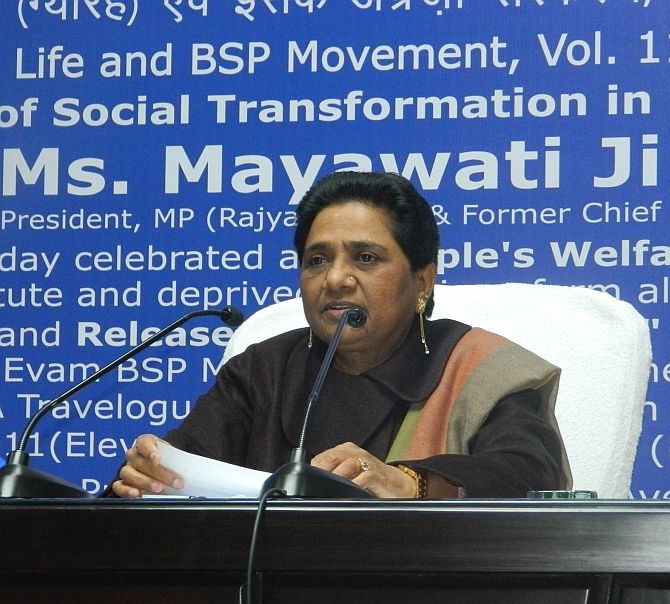
'Mayawati did not change with time.'
'She continued to work with her own arithmetic and took her vote bank for granted.'
'Arrogance, security paranoia, demonetisation defeated Mayawati'
How much credence do you give to Mayawati's allegations that the EVMs were tampered with?
These charges are ridiculous. There is no credence to her charges.
Her statements are aimed towards her support base, her voters.
She is trying to tell them that the BJP did not defeat Mayawati, but the EVMs did.
This is her way of keeping her support base intact and preventing them from shifting allegiance to the BJP.
What explains the BSP's complete rout?
Mayawati did not fight these elections with any commitment when the fact is that this party was built only on commitment.
I have been consistently maintaining this since last December how attacking demonetisation was a bad idea when the common man at the grassroots level was happy about it and believed that demonetisation will put an end to black money.
Mayawati did not change with time.
She continued to work with her own arithmetic and took her vote bank for granted.
She never cared to cultivate them, she was inaccessible, remained arrogant, was full of her security paranoia.
You cannot treat people like a despot.
She did not step out much of her house; even her campaign was all about flying to a rally, addressing it and flying out.
When demonetisation happened, she did not realise that the ground was slipping under her feet.
The have-nots were all Mayawati supporters who began praising Modi and this woman did not realise that.
She could not grow her party beyond what (BSP founder) Kanshi Ram left for her as his legacy.
Another mistake she made was in making loud, blatant appeals to Muslims to vote for her and that helped Hindu votes to consolidate in Modi's favour.
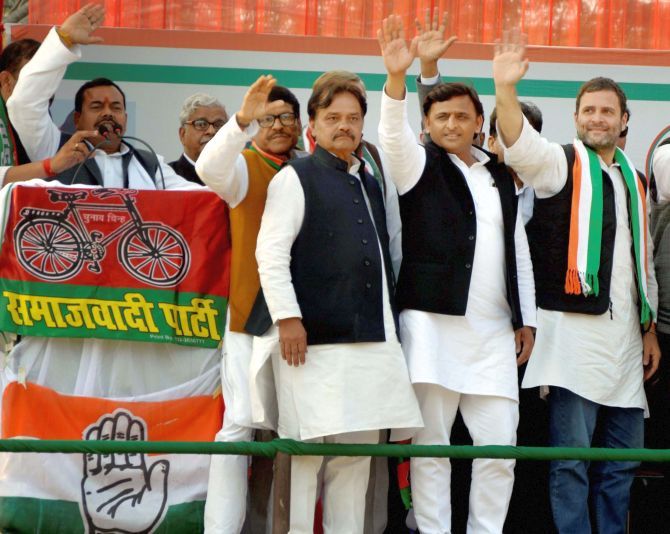
The miserable show of UP ke ladke
Why did UP ke ladke -- as Akhilesh Yadav and Rahul Gandhi branded them -- fail to stop the Modi wave?
There is no doubt that Akhilesh did some development work in Uttar Pradesh, but that remained limited to Lucknow, whether it was the Metro, the cricket stadium or the IT city.
The reason people believed Modi was because they could clearly see that Akhilesh was clearly biased towards his own community (the Yadavs) and the whole family was involved in this business.
Modi repeatedly emphasised on this (Yadav) family enterprise. In fact, even the Yadavs did not vote for the SP-Congress gatbandhan (alliance) in overwhelming numbers.
Then the tie up with the Congress was also a misadventure.
They did succeed in consolidating the Muslim vote to some extent and the slogan 'UP ko yeh jodi pasand hai' ('The UP voters like the Akhilesh-Rahul alliance of youth')) was an appeal to the youth, but the youth were already with Narendra Modi, which none of the political parties in UP could understand.
The youth (UP voters) always does not naturally support the youth (Akhilesh-Rahul).
It is the same pattern which did not work when Mayawati thought that she would garner all the Muslim votes and so she announced 107 Muslim candidates.
But when your systemic induction is via money you are every time compromising on the winnability of your candidate.
A Muslim with real potential, if he did not have crores, did not get the BSP ticket.
Those Muslim candidates, who were moneybags, were only interested in getting some political mileage by contesting the elections on the BSP's behalf.
The culture in UP politics is such that they won't mind spending crores in getting an assembly ticket from a party and even if they lose they will put a poster on their cars emphasising that they are ex-candidates of so and so party.
But Muslims do not vote just because you are a Muslim moneybag. They have their own mind when they go out to vote.
The role of the Muslims behind BJP's mandate
Did Muslims shift their allegiance to the BJP in the 2017 assembly elections then?
I would believe that some Muslims did vote for the BJP, otherwise such a huge mandate is not possible.
A very small, yet significant number of Muslims did vote strategically.
I know a lot of voters in Lucknow with their families, en bloc, voted for the BJP, but these were in small, yet decisive numbers.
What makes me believe this theory is the BJP candidate's victory in Deoband, the home to the school of Islamic thought, where the Muslim population is 72 per cent, and the BJP candidate won from this seat.
Has the BJP then succeeded in breaking the ice with the Muslim community; addressing their concerns vis-a-vis BJP's past?
In 2014, I certainly think that Modi built a strong rapport with the Muslims.
In those elections, he did not talk communal; the tone of his speeches was about vikas (development). But in this election, he did speak about kabristan (graveyard) and shamshan (Hindu crematorium).
But yet the Muslims voted for the BJP?
This issue was given to them by Akhilesh on a platter. He had made certain budgetary provisions for raising boundary walls around kabristan.
And this was a huge allocation at Rs 700 crore, which I am sure half of it must have been gobbled up by bureaucrats, ministers and engineers.
This bargain was bound to turn communal.
In his first year in power, Akhilesh announced Rs 30,000 to all Muslim girls who passed Class 10 and a further incentive of Rs 30,000 for higher education. But this was to all Muslim girls and not just poor Muslim girls.
This clearly worked against him, though he later corrected this.
The BJP used this as a peg and went about lambasting every scheme; even the good ones were labelled communal and the BJP succeeded in conveying to the UP voters that Akhilesh was interested only in the welfare of Yadavs and Muslims.
This was an offensively pro-Muslim approach and it led to counter polarisation with the result that the Hindus and non-Yadavs drifted towards the BJP.
But remember that like 2014, 2017 was also Modi's election; this is not a BJP election (victory).
Every voter you met, apart from those who are BJP cadres, everybody said they would vote for Modi, not the BJP.
Rahul vs Priyanka: What the Congress needs now
What is the Congress' future now, especially the Gandhi family, given they were wiped out even in their pocket boroughs of Amethi and Rae Bareilly?
The Congress will have to reinvent itself. They have to rise beyond the Gandhis. It is sad that today they are nowhere in the picture.
Ultimately, they (the Congress party and the Gandhi family) can't remain blinded by this mandate.
Also, such a huge mandate (for Modi and the BJP) can go to their heads and this will not be good for India's democracy.
So, survival and rejuvenation of the Congress is important for the survival of democracy in India.
I don't know how many Muslims have got elected from the SP and BSP, but this will be the poorest Muslim representation in the UP Vidhan Sabha (legislative assembly) in the history of India.
Do you pin your hopes on Priyanka Gandhi to revive the party in UP and India?
There is no harm in trying Priyanka Gandhi. She certainly has more connect, more vibrance, more spontaneity (than her brother Rahul Gandhi).
But I think that Indian mothers, like Italian mothers, have the problem of putra prem (love for their sons).
Having said that, a grassroots, local leader is a must (for the Congress' revival in UP).
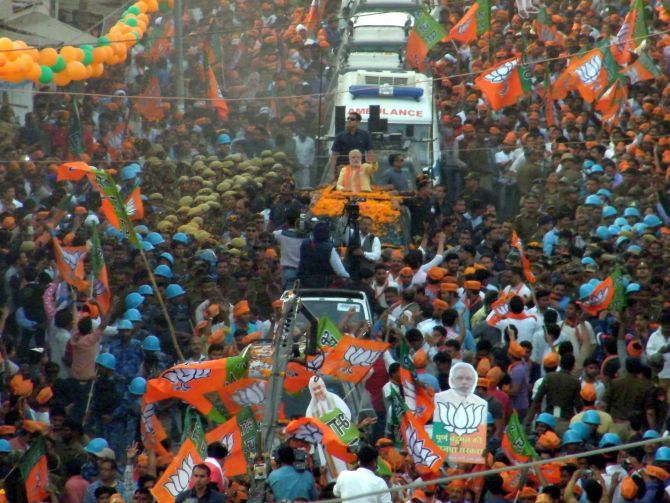
'He played the communal card only in those parts of UP that needed counter polarisation.'
Narendra Modi campaigns in Varanasi, March 5, 2017
'Modi is a one-man army, one-man industry'
What were the most important factors responsible for the BJP's sweep in Uttar Pradesh?
The one and only factor is the Modi juggernaut. He is the one who turned the tide.
The wave which he created in 2014, and to maintain it for three years, is a huge task in itself.
One must also accept his strategic acumen to successfully turn from his development mantra into communal narrative without it affecting the party's electoral prospects.
He played the communal card only in those parts of UP that needed counter polarisation.
For that one must blame Akhilesh also for giving him these polarising issues on a platter.
Also, Yadavisation of the police force in UP went against the family, along with the way the father and son bickered with each other.
In police stations, often a Yadav police officer would show insubordination to the DIG and SP.
These Yadav officers would threaten their superiors with transfers too.
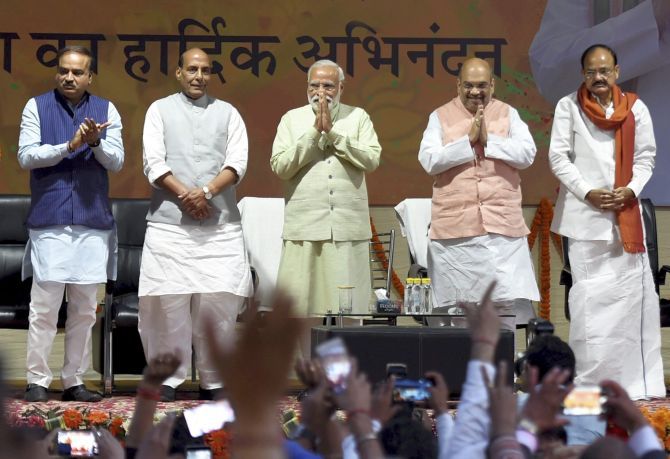
'Credit goes to the product, and the product was Brand Modi.'
Narendra Modi with BJP President Amit Shah, Union Ministers Ananth Kumar, Rajnath Singh and M Venkaiah Naidu at the party headquarters, March 12, 2017. Photograph: Kamal Singh/PTI Photo
No credit for Amit Shah for his Chanakya-like shrewd strategies?
His credit would only be for putting the nuts and bolts in place.
But this kind of victory is not possible with just tying the nuts and bolts.
This is possible only when their is messianic charisma and Modi has it in him.
Amit Shah doesn't have that charisma. Yes, he has done his spadework; BJP cadres are a motivated lot and pretty organised.
In fact, Amit Shah was very dictatorial with the rank and file of the party; he had brought leaders from Rajasthan who were doing lot of work and that was much disliked by BJP cadres in the state.
But then when you are selling a product like Modi, the marketer (Amit Shah) doesn't get much credit.
Credit goes to the product, and the product was Brand Modi.
Modi has established himself as some kind of a messiah in the country with this humongous BJP mandate in India's most populous state.
India's youth like Modi's aggression and, mind you, he made only promises.
But his promises carried more credibility than Akhilesh's actual work, who has lost all the credibility.
Who do you bet your money on as the next chief minister of Uttar Pradesh?
That's the most difficult question because the only trouble with this man (Narendra Modi) is he is all about 'I, me and myself'.
Modi is a one-man army, one-man industry.
But he will be a big flop if he tries to rule UP by proxy.
UP is not a small state like Haryana which can be remote-controlled.
If Amit Shah picks up somebody like Keshav Prasad Mourya (the state BJP president), then they have had it.
His only link to the BJP is of being a VHP activist and a chamcha of (the late VHP chief) Ashok Singhal.
Does Rajnath Singh then fit the bill?
There are good people in the party like Santosh Gangwar, but then they will have to look at the caste composition and how it will benefit them in 2019 (the Lok Sabha elections).
Modi will not like to have a strong man like Rajnath Singh because he trusts nobody.
Modi ka yeh bhi toh problem hai na ki (Modi's problem is that) he doesn't like development credit given to anybody else.
Who would be your choice?
I don't have any choice because all politicians are alike.
But there is this mayor of Lucknow, Dr Dinesh Sharma, a low profile guy with a clean reputation, a professor of commerce in Lucknow University.
Another face is that of Manoj Sinha, a Bhumihar by caste, who is minister of state for telecom and railways.





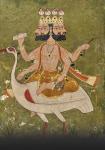



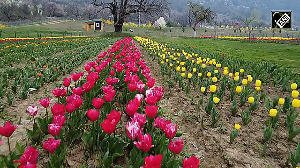

 © 2025
© 2025